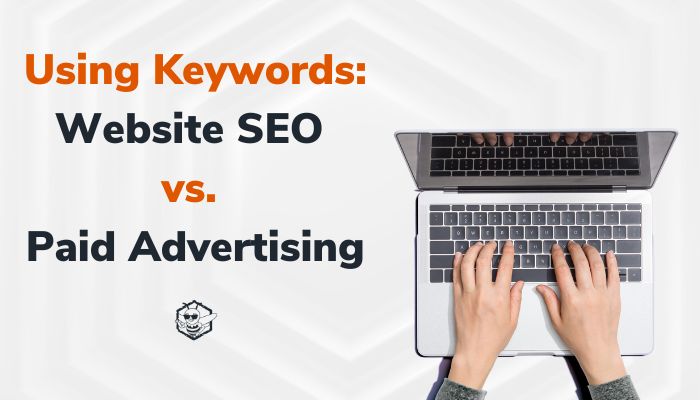When it comes to digital marketing, there are many moving components working together to build strong websites and successful campaigns. A fundamental building block to digital marketing is the use of keywords for website content, and everything else that shows up on a search engine results page.
Let’s talk about the differences between keywords for website search engine optimization (SEO) and Pay Per Click (PPC). We’ll focus on how to use them together to leverage your website for growth and lead generation.
Quick Links:
What Are Keywords?
Keywords are the glue that binds your website SEO and paid advertising together. Keywords do not need to be singular words, but more commonly are a phrase or group of words that someone would search for within a search engine.
This starts with understanding your customer and what they’re looking for online. Any business that is marketing online (which should be just about every company), needs to understand what product or service you are marketing and to whom you are marketing. You can refine your target market with our free Buyer Persona Worksheet.
Once you know whose attention you’re looking for, you can start researching which keywords are being used to search for information, answers, and products related to your business and industry. This process should be comprehensive, and you should look for all possible keywords related to your business, products, services, and existing content.
There are many tools that are very useful for determining which keywords are ideal targets for your business. Keywords Everywhere is one tool we find particularly helpful. It is a powerful way to research keywords and develop a competitive analysis.
If you’re not sure where to start on your own, learn how to do your own keyword research or reach out to us at HIVE for a free SEO Audit. We are experts at strategic and white hat search engine optimization campaigns that produce results.
For instance, if you are a home furniture store you may have many products for sale on your website. This type of business will want to focus on keywords and phrases that are directly related to what they are selling in addition to targeting informational queries related to the furniture-buying process. A list of keywords might include big comfy couch for sale, comfy couches for sale, living room furniture, at-home furniture, home furniture store, how to find the best couch — the list goes on. And while this is a very specific example, the premise is the same for any business.
When targeting keywords, you’re trying to identify any and all search queries your leads might be using online so you can target those phrases when creating content for your website or paid advertising. The point is, through solid keyword research any company can identify which keywords and phrases offer the best opportunities to increase website visits.
Understanding Keyword Metrics
When looking at keyword metrics there are three categories you should focus on. The first category is the search volume, meaning the average number of times a particular keyword or phrase is searched each month. This is important for both SEO keywords and paid advertising keywords. If a keyword doesn’t have a high enough search volume to make it worth the effort to attract those searchers, then don’t use it. Focus on popular keywords that are still feasible and not over-saturated with competition.
The second category is the cost per click (CPC) of a particular keyword. This is only relevant for paid advertising keywords, but it can also give you an idea of the value of your keyword rankings when you look at it from an SEO perspective. The CPC of a keyword depends on the demand for that keyword through advertising. The higher the demand, the higher the cost per click. When advertisers bid on keywords, the better their website SEO, advertising copy, and budget, the better an opportunity to win an auction.
The final category is the competition score. This is a measure of how many other websites are ranking or trying to rank for your specific keyword or phrase. The more websites that are trying to rank, the harder it will be to get to the first page. We recommend focusing on keywords with under a 60 competition score as they will provide a better opportunity to rank. NOTE: different keyword research tools present this metric differently. Some do a 0-100 scale and some do a 0-1 scale. Either way, shoot for keywords with a sub-60 or sub-0.6 score in order to focus on the low-hanging fruit. In that same vein though, if a keyword has great intent and fits extremely well with what your business does, it is ok to go above that 60 benchmark.
Using Keywords For Website SEO
Once you have identified which keywords you want to target, the next step is to implement these words into your website content and marketing strategy.
Start with a website audit of what is already there. Take into consideration the written copy of your website, including individual web pages, landing pages, and blog posts. Go through each page, focusing on areas where keywords can be added or incorporated naturally into your text. Pay attention to page titles, H1s, H2s, meta-description, slug, and of course the paragraph copy on the page.
Search engines are very smart, which means that you’ll get dinged if you’re keyword stuffing (using as many keywords as you can instead of using keywords naturally in your content) and on the other side, you can be ranked highly for valuable, informative content that answers search queries. In recent years, search engines have transitioned to more of a focus on content that is incorporated into topic clusters, which supports overarching topics and includes interconnected keyword-focused content.
Establishing a keyword-oriented website content should be your first step when developing a campaign strategy. If your website is not optimized for keywords, it will not rank organically on search results and your advertising will suffer as the result of lousy landing pages. Get your house in order, organized, and optimized before starting paid advertising.
Leveraging Keywords For Pay Per Click (PPC)
When it comes to paid advertising, the impact of keywords remains the same as website SEO. They are needed to target high-value audiences with value, informative content. Keywords in advertisement copy play a huge role in search engine results.
Similar to SEO, pay attention to an advertisement’s titles, description, callout extensions, structured snippets, and site-link extensions. Utilize keywords creatively throughout the advertisement to clearly communicate what users will find by clicking your link. The better you can describe your linked landing page while incorporating keywords, the higher your opportunity to succeed with advertising through a higher quality score.
Curious about whether your PPC campaigns are created well? Get a free Pay Per Click Evaluation.
How SEO and PPC Working Together
Google is smart. Search engines have the ability to know what you are searching for before you can finish your query. Google thinks beyond the keywords themselves and has the ability to associate meaning behind not only the word but the intent behind the word, how will content addresses those words, and how well additional supporting content is related back to those words.
When writing copy for website SEO and pay per click, it is important to keep in mind the reason for using a particular keyword in your message. Not only are you trying to bring attention to your website, but you also need to focus on how well you’re answering the queries your leads are looking for. Have a strategy and stick to the game plan as you develop your website with purposeful content.
Once you have built an optimized website, paid advertising will have a greater impact on your sales and brand awareness. Your pay-per-click campaigns will serve as the first point of contact for potential customers to find your website. You want to make a good impression. Google wants to serve only the best information to its users. The advertisements with the best copy and most valuable linked landing page will get shown to users, ultimately outbidding and outperforming the competition.
Want To Improve Your Digital Strategy? Start with your website.
Depending on the nature of your company, creativity may not be in your wheelhouse, but there are always opportunities to improve your online presence. A revamped website is the foundation for any marketing campaign you're creating in 2022, which means that if your website isn't in top shape you're missing out on attention from leads and customers.










